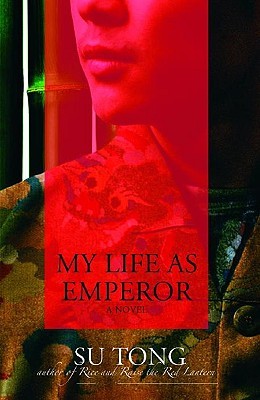 My Life as Emperor
My Life as EmperorSu Tong
Translated by Howard Goldblatt (Chinese)
Originally published 1992, I read 2006 paperback
290 pages, historical fiction
Found: Half Price Books, Hamilton, OH, USA
After his father's death, the fifth son, 14-year-old Duanbai, is unexpectedly declared to be the new Xie Emperor. Unprepared for his new duties and still a child, Duanbai's actions are controlled by his powerful mother and grandmother; when he makes decisions himself, his inexperience leads him to abuse his power, and he becomes a cold and cruel ruler who is feared by the people around him.
I saw this book on the $1 clearance rack at Half Price Books right after I had finished reading Howard Goldblatt's beautiful translation of Nobel Prize-winner Mo Yan's Frog. Since I was on a bit of a Chinese kick at that time, and since I adored Goldblatt's translation style, I spent the dollar hoping that I would enjoy this book as well - not that I had actually been all that interested in the summary on the back cover. So after taking it with me to India and then to Bangladesh, I finally picked it up from the To-Be-Read stack. The good news: it's a quick read. The bad news: I hated it.
My dislike of this book is primarily because of the main character, who is also the narrator: Duanbai, the child emperor. From the time he takes the throne, Duanbai is incredibly cruel to the people around him. For example, there is a building on the palace grounds where his father's discarded concubines are imprisoned. The women weep and mourn over their fate. So what does Duanbai do? He has their tongues cut out. That way they will not be able to make noise and bother him! When met with anything that displeases him (even trivial things), he physically punishes the person responsible - through torture, cutting off of various body parts, execution.... Or, alternatively, you could say that he removes minor irritants by removing parts of other people's bodies. Duanbai is the narrator, and he wants to be a sympathetic character. He wants you to understand his motives. But, at least for me, his actions made that nearly impossible.
The other side of the coin is the rapidly disintegrating empire. This is mostly Duanbai's fault; his inability to show compassion toward anyone else leads to a peasant rebellion, and his inability to rule effectively (along with palace politics) leads his brother to revolt against him. A common refrain throughout the novel is that calamity will befall the empire; with a ruler who is so stupid and arrogant, no wonder it does.
The writing style is similar to a folk tale or oral history, simplistic and with lots of repetitions throughout the text. Hearkening back to old-style historical epics, this was an effective way to tell the story, but I found it rather boring. If you can get through the first 200 pages, the story becomes a bit more interesting after he is deposed and made into a commoner - but if you expect him to learn a lot from suddenly losing his rank, think again. It seems that he has no capacity for repentance, just as he has little capacity for compassion.
One thing that I did find interesting was Duanbai's possible mental illness. It seems that he is occasionally haunted by disturbing hallucinations that make it impossible for him to function normally. This results in him losing his ability to speak for a time. However, I was disappointed that these signs of mental illness seem to be an afterthought and not a main part of the narrative for most of the book.
I would not recommend this novel. Maybe if you would like to read about the callous inner thoughts of an incredibly cruel person you would find it interesting. It is not to me. This one is staying in Bangladesh.
My Life as Emperor can be purchased in the US from Amazon and IndieBound, in the UK from Amazon and Hive, in India from Amazon and flipkart, and worldwide from wordery.
I enjoyed the book but I must admit that the main character's cruelty was disturbing in multiple scenes, but the character's personality was realistic for someone in his situation. If you look at absolute rulers of the past, you will realize that many monarchs throughout history have been raised without any real rule or restrictions and many certainly did not have the opportunity to learn to love and be loyal to others like a common person would. Dumbai has also grew up in an environment where cruelty was a common punishment.
ReplyDeleteDumbai's brother, on the other hand, was more selfish and arrogant than the actual main character. The empire's overall fall had more to do with the main character's brother than the main character himself.
I agree about the realism. Just wasn't my cup of tea at all.
Delete